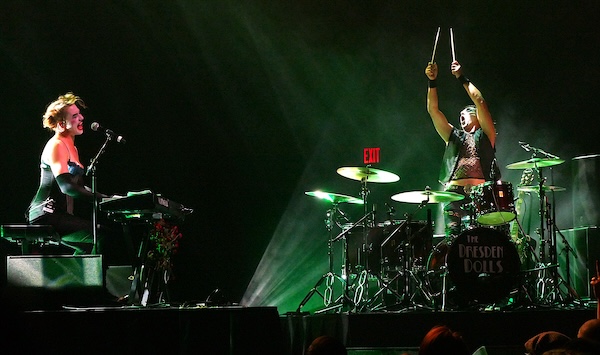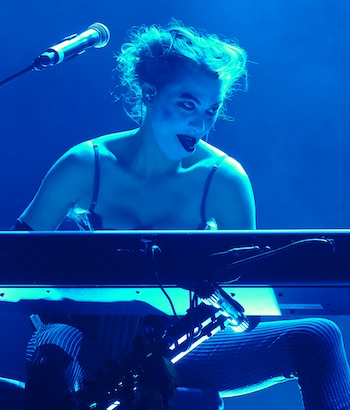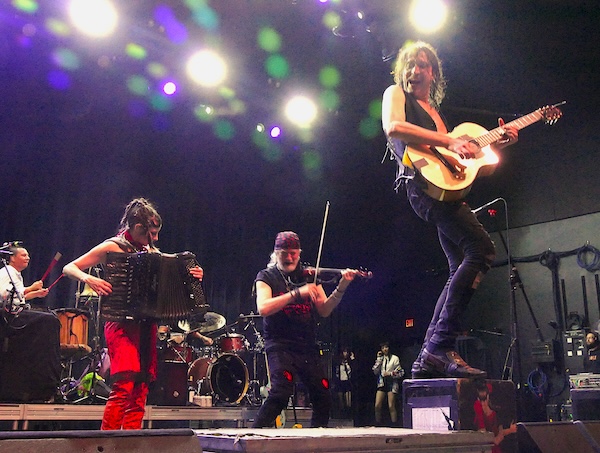Concert Review: The Dresden Dolls and Gogol Bordello Rage Against the Machine
By Paul Robicheau
Saturday’s finale of a two-night Roadrunner stand, the Dresden Dolls’ first Boston shows since 2017, raged as a celebration of camaraderie and catharsis.

Amanda Palmer and Brian Viglione of the Dresden Dolls at Roadrunner. Photo: Paul Robicheau
Amanda Palmer laid down two goals for fans packing Roadrunner on Saturday. The first was to “please, for the love of God,” vote. The other, Palmer stressed, was “You can come to a Dresden Dolls show and rage against the machine.”
The singer/pianist’s punk-cabaret duo with drummer Brian Viglione operated on the fringes of the mainstream machine even at the Boston band’s height in the early aughts. The same went for their core goth-art following of outsiders. And Saturday’s finale of a two-night Roadrunner stand, the Dolls’ first Boston shows since 2017, raged as a celebration of camaraderie and catharsis.
The camaraderie spread to the kindred musicians of Manhattan’s gypsy-punk powder keg Gogol Bordello and Honk! Festival favorites Emperor Norton’s Stationary Marching Band. Together, the bands staged a marathon topping four and a half hours.

Amanda Palmer and Brian Viglione of the Dresden Dolls at Roadrunner. Photo: Paul Robicheau
“I’m on fire!” Palmer declared in “Good Day” to launch the Dolls’ back half of the monster bill with the lead track of their 2003 debut, and it was great to see her back pounding electric piano opposite drummer Viglione again. Sporting their mime-esque makeup, they milked every stroke to dynamic, dramatic effect, retaining their initial verve with a flippant “Sex Changes” and “Backstabber” in a set near-evenly split between the band’s first two albums and other songs.
Part of what makes the Dresden Dolls so charismatic onstage is how the pianist and drummer lock into volatile, balanced roles. Palmer still banged the keys with rumbling percussiveness while Viglione — who’s regularly the more theatrical member with his flourishing drumsticks and bowler hat — delivers explosive bursts of drum fills that both power and decorate the music.

Brian Viglione of the Dresden Dolls at Roadrunner. Photo: Paul Robicheau
That symbiotic musical relationship also came across in songs favoring the duo’s flair for soft/loud shifts with teasing pauses like “Missed Me” and “Coin-Operated Boy,” where the mock-mechanical Viglione finally snuck behind Palmer, crowned her with his hat, dropped his sticks, and gave her a hug.
But the Dolls’ triumphant homecoming came with melancholy as well. An emotional Palmer explained the loneliness she experienced after being stuck in New Zealand for two and a half years during the pandemic and how she and her son recently moved back to Boston (after the end of her marriage to writer Neil Gaiman) with newfound gratitude for friends and family. That contributed to a mid-set lull where Palmer sang the forlorn “Whakanewha” (named for a New Zealand island) and “Another Christmas,” another downer where she gamely shook sleigh bells while Viglione strummed acoustic guitar. Luckily, the duo’s stage-front foray picked up with a brash, playful romp through “Mein Herr” from the musical Cabaret, Viglione rolling to his back, kicking his heels.

Amanda Palmer of the Dresden Dolls at Roadrunner. Photo: Paul Robicheau
But that mid-section lost momentum overall, preceded as it was by a lengthy send-up of Carole King’s “Pierre” (iced by Viglione’s pinch-voiced refrains “I don’t care!”) and Bo Burnham’s jaunty “Welcome to the Internet,” then followed by the lesser Dolls nugget “Mandy Goes to Med School.”
Sure, it was a nice gesture to provide some variety, plus rarities for diehards. But near the two-hour mark, when Palmer said they’d play all night instead of ending like a normal band (“We’re like the Bruce Springsteen of punk cabaret”), some people likely groaned — especially when she announced three Boston-associated songs to come. Granted, inviting jazz singer Veronica Swift out to share peppy vocals on “The Jeep Song” and “Massachusetts Avenue” added a fun twist. And even as some fans wearing Dolls-like garb were edging toward the exit, the duo dug into a tension-thick “Half Jack” and the requisite tear through misfit rager “Girl Anachronism” to cap the 20-song set.
Of course, the roller-coaster ride might not have hit such slow spots if the Dolls didn’t have to follow an hour-long tornado supplied by contemporaries Gogol Bordello. Led by Ukrainian-born pied piper Eugene Hutz, the New York octet unleashed a nonstop barrage of global punk brimming with guitars, violin (brandished by ace foil Sergey Ryabtsev), accordion, and gang vocals, Hutz and his comrades hopping on and off stage-front risers to exhort the crowd. The set roared to a peak with “Immigraniada” (championing immigrant resolve) and the group’s dance-hearty hit “Start Wearing Purple” before the night’s biggest surprise.
Gogol Bordello introduced “masked avengers” (of course, the Dresden Dolls in eye masks) for a moody, mischievous encore of Nick Cave’s “Red Right Hand.” Palmer traded verses with Hutz as they slinked and rolled about the red-hued stage, sharing a glass of wine like a prop, while Viglione stuck notes on the song’s trademark chimes. Given its novelty and delivery, it was a hard finale to top, though the Dolls later brought out their own marching crew of friends for “Sing” to finally bring a wild and winding night to a communal close.

Gogol Bordello at Roadrunner. Photo: Paul Robicheau
Palmer told the crowd that the Dresden Dolls wouldn’t play again for a long time (in part because a new album is in the works). Still, at the same time, she offered hope. Urging people to sign up for their mailing list in an old-school way, Palmer declared, “We want to be a band forever!”
Paul Robicheau served more than 20 years as contributing editor for music at the Improper Bostonian in addition to writing and photography for the Boston Globe, Rolling Stone, and many other publications. He was also the founding arts editor of Boston Metro.
Tagged: Amanda Palmer, Brian Viglione, Dresden Dolls, Emperor Norton's Stationary Marching Band, Eugene Hütz, Gogol Bordello
